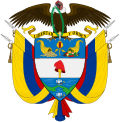| |
|---|---|
 | |
 The information page of a Colombian biometric passport (since 2018). | |
| Type | Passport |
| Issued by | |
| First issued | Biometric passport (September 2015, 01) Current version (July 2018, 15) |
| Purpose | International travel |
| Eligibility | Colombian citizenship |
| Expiration | Valid for 10 years after issuance (persons aged 18 and over) Renewal for children (Passport must be renewed when the person is 7 years old, after processing the tarjeta de identidad) Renewal by age of majority (the passport must be renewed when the person is 18 years old, after processing the identity document) |
| Cost | 269.000 COP (USD69) |
Colombian passport (Spanish : Pasaporte colombiano) is a travel document which is issued to nationals of Colombia for the purpose of international travel. Since September 2015, a biometric passport has been issued, but the previously issued machine-readable passport can be used until its expiration date.
Contents
Colombian citizens do not need a passport when traveling to Argentina, Bolivia, Brazil, Chile, Ecuador, Paraguay, Peru, Uruguay, and Venezuela. For these countries, they may use just their domestic identification cards called Cédula de Ciudadanía. [1] [2]
Several drivers resulted in the issuing of the document:
- The International Civil Aviation Organization (ICAO) issued Resolution No. A36-15 in which it urged its 190 member countries to issue machine-readable passports from 2010. The intent of this resolution was to ensure the security and integrity of travel documents worldwide.
- Increased safety: The new book has special design features, and print materials that correspond to three levels of security.
- Allowing quick migration processes: the machine-readable zone facilitates the process of recognition and registration of the passenger when entering or leaving a country, because a machine automatically interprets the information encoded in their passport, which reduces approximately 50% on-call time by immigration agents.

